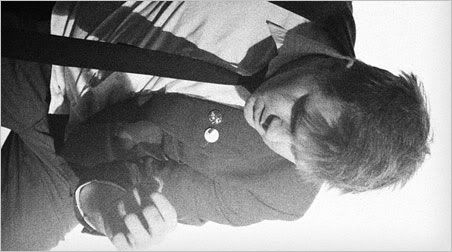
“I Can Change”
from the album This is Happening
2010
iTunes
James Murphy could pass for an unshaven auto mechanic not a rock star, but there he is posing on the cover of the latest LCD Soundsystem album as a rakish Bryan Ferry, wearing a suit and tie and getting down like he was the coolest Mac Daddy to ever hit a dancefloor.
Murphy has been balancing sophisticated taste in disco and art rock with a prickly punk aesthetic for the last decade, first as producer for influential singles by the Rapture and the Juan MacLean, later as auteur of LCD Soundsystem. On the band’s third studio album, This is Happening, he remains in thrall to the cutting edge brand of dance music that flourished during Ferry’s Roxy Music heyday. He references David Bowie’s ’70s work with Brian Eno (“Heroes”) and Iggy Pop (“The Idiot”). And he clearly adores Talking Heads, particularly the intricate polyrhythmic arrangements on Fear of Music (1979) and Remain in Light (1980). Though never highly original, Murphy has great taste in source material and an imaginative approach to reconfiguring it as tracks that bridge dance, rock, and underground music.
At first he came across as a brilliant manipulator with a knowing, wise-guy sense of humor (as evidenced by early singles “Losing My Edge” and “Daft Punk is Playing at My House”). But on LCD Soundsystem’s second album, the 2007 release Sound of Silver, Murphy injected an emotional depth and tenderness that gave tracks such as “Someone Great” and “All My Friends” a resonance beyond the dancefloor.
This is Happening takes a similar approach. It in many ways is the most danceable LCD album yet, a celebration of losing yourself in semi-darkness and a sea of undulating bodies between the speaker cabinets. Seven of the nine tracks stretch well past six minutes to prolong the moment. Murphy piles all the detail into the rhythm, an intricate array of drums, drum machines, glockenspiels, hand claps, tambourines, congas, woodblocks and his ever-trusty cow bell — an instrument that he almost single-handedly rehabilitated from punch-line status.
In LCD world, texture is as important as melody, though there is no shortage of that — despite the protestations of “You Wanted a Hit.” As that song’s self-deprecating humor affirms, Murphy still enjoys playing the cut-up. He practically revels in the role on “Drunk Girls,” which if nothing else proves that Murphy can write a song as catchy and shallow as Lil Wayne’s “Lollipop.”
What’s different is that Murphy has become a better singer over the last decade. He plays around successfully with falsetto, he can croon a bit, and he can pull off the “I Can Change” lie that so many desperate guys have tried in the past and make it sound sincere. The vulnerability alternates with giddiness, and the album takes on the loose structure of a long night out.
Murphy isn’t one for big statements. But this album makes one anyway, almost in spite of itself. The opening track is called “Dance Yrself Clean” for a reason; it suggests that dance music isn’t just a hedonistic pursuit, but a necessary pressure release from the stresses of the everyday. And then “Home” ties it all together: “So grab your things and stumble into the night / So we can shut the door and shut the door on terrible times,” Murphy sings. It builds a slow, steady, trance-like groove and glides off into the darkness wearing a suit and tie and looking like Bryan Ferry, if only for one night.
